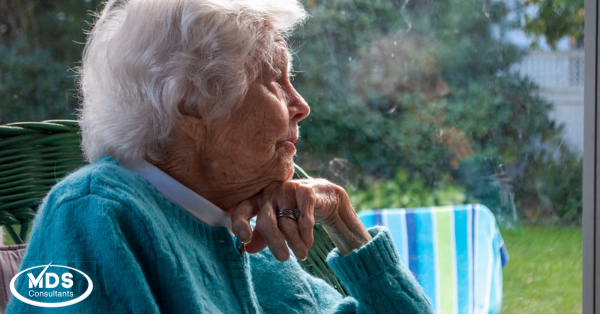Known Impact of COVID-19 on Dementia Patients
As we start to shift our attention to the long term effects that this pandemic has had on our residents, a key area of focus is dementia outcomes. Early on, many quick decisions were made to protect one of our most vulnerable patient populations. Recent studies have found that residents with dementia who contract COVID-19 have a higher risk of behaviors, depression, anxiety, impaired sleep, and worsening cognition long after the infection has cleared. Studies also show that isolation increases health risks for residents with dementia.
COVID-19 screening techniques are less effective for older adults as they do not present with the typical COVID-19 symptoms. Not recognizing a resident who has an active infection is contributing to the spread of COVID-19 in skilled nursing facilities. So far we know that it is the inflammatory and vascular effects of the infection that contribute to this increased risk of long term psychiatric and medical effects.
Do improved isolation policies prevent widespread infections? While CMS and the CDC continue to encourage social distancing policies as a way to minimize the spread of COVID-19 in those with active infections, residents with dementia have suffered adverse outcomes in the setting of isolation. Residents in isolation may be at increased risk for:
- hypertension
- cardiac disease
- cognitive decline
- dementia/cognitive decline
- low mood
- anxiety
- agitation
- behaviors
- increased caregiver burden
For this reason, CMS and CDC have modified visitation policies, recommending that nursing facilities should not restrict the amount of visitors or visitation times.
Use the RAI to Improve Dementia Care
Accurate care planning and utilization of the RAI process is necessary for ensuring that facilities appropriately address all of their resident’s mental and physical health concerns. Accurate coding on the MDS will help you to identify changes in your residents over time. It may be your first clue that something is different and requires a new intervention. Sections that cover diagnoses, behaviors, cognition and mood are particularly helpful in addressing psychiatric concerns. Care area assessments should include a resident’s history of COVID- 19 infection or social isolation and how that is influencing the resident’s presentation.
Addressing behavioral care issues promptly and appropriately in care planning will allow your facility to shine above the rest, leading the way in progressive dementia care.
Care plans should include a plan for accommodating visitors and infection prevention programs to promote socialization and meaningful activities. Studies in dementia have long shown that social interactions and meaningful activities slow the decline of dementia. This will lead to decreased mortality and better outcomes in resident, despite the risks associated with a COVID 19 infection.
For staff, this will prevent complexities in care and burnout. For the facility, this will improve staff retention, improve quality measures, and lead to regulatory excellence.
Additional Resources:
- https://www.cms.gov/files/document/qso-20-39-nh-revised.pdf
- Impact of social isolation on behavioral, functional profiles, and hippocampal atrophy asymmetry in dementia in times of Coronavirus pandemic (COVID-19): A translational neuroscience approach. https://www.ncbi.nlm.nih.gov/pmc/articles/PMC7732415/
- Neuropsychiatric Symptoms in elderly with dementia during COVID-19 pandemic: Definition, treatment, and future directions. https://www.ncbi.nlm.nih.gov/pmc/articles/PMC7550649/
